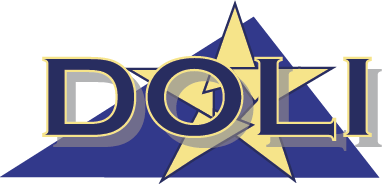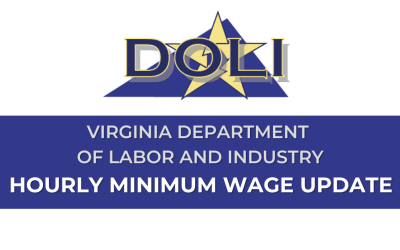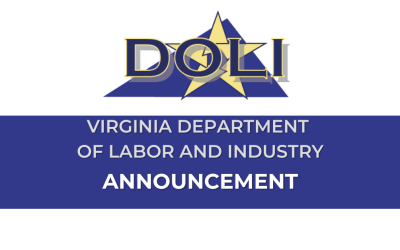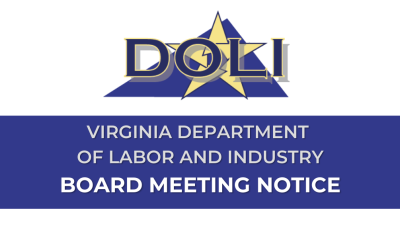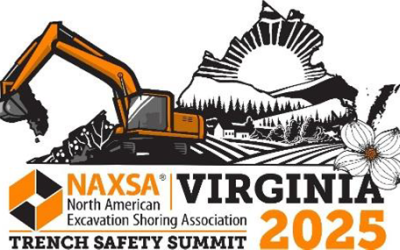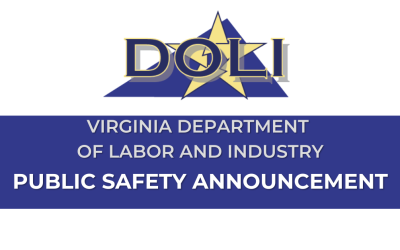News and
Announcements
Statutory Virginia Minimum Wage Increase Effective January 1, 2025
During the 2020 Regular Session, the General Assembly reenacted the Virginia Minimum Wage Act. The new statute stated the Commissioner of Labor and Industry shall establish the adjusted state hourly minimum wage by October 1, 2024, to take effect on January 1, 2025, and then annually thereafter, if the General Assembly did not reenact scheduled increases to the minimum wage rates.
Accordingly, it is the duty of the Commissioner of the Virginia Department of Labor and Industry (DOLI) to establish the adjusted state hourly minimum wage effective January 1, 2025. Pursuant to the Virginia Minimum Wage Act, the adjusted minimum wage rate shall be a sum of the current minimum wage rate ($12.00 per hour) and a percentage of the current minimum wage rate equal to the change in Consumer Price Index for all items, all urban consumers (CPI-U) for the most recent calendar year, as calculated and published by the United States Bureau of Labor Statistics. The U.S. Bureau of Labor Statistics defines the Consumer Price Index as “a measure of the average change over time in the prices paid by urban consumers for a market basket of consumer goods and services.”
In December 2023, the U.S. Bureau of Labor Statistics published an annual increase in CPI-U of 3.4%. Effectually, the nondiscretionary formula for adjusting the Virginia minimum wage rate is $12.00 + ($12.00 x .034). This calculation equals $12.41. This adjusted rate will be in effect from January 1, 2025 to January 1, 2026.
For the period of January 1, 2025, until January 1, 2026, the established adjusted state hourly minimum wage is $12.41 per hour. Employers must pay all employees covered by the Virginia Minimum Wage Act at a rate not less than the adjusted minimum wage rate.
Annual adjustments to the Virginia minimum wage rate will continue in future years by this same methodology. For questions regarding this calculation or Virginia’s minimum wage laws, please contact the Department of Labor and Industry’s Division of Labor and Employment Law at (804) 786-2706 or laborlaw@doli.virginia.gov.
DOLI sent a letter to business groups in Virginia, to provide notification of the increase, and a copy of the letter can be found here. DOLI also provides an optional notice, which employers may post for awareness, a copy can be found here.Protecting Workers from the Effects of Heat
Exposure to heat is a serious occupational hazard, affecting both indoor and outdoor workers. Without proper training and protective measures, it can lead to severe—and sometimes fatal—illnesses. The good news: heat-related illnesses are preventable. Understanding the risks and solutions can make all the difference in safeguarding employees from harm. Learn how to protect your workforce. Working in Outdoor and Indoor Heat Environments
Study: VOSH Programs provide substantial economic benefits to the Commonwealth
The University of Virginia’s Weldon Cooper Center for Public Service conducted a study to evaluate the economic effects of the VOSH compliance programs on workplace safety, health, and economic growth.
The study concluded that the VOSH compliance programs provide substantial economic benefits to the state of Virginia by reducing workplace injuries and illnesses, improving worker productivity, and generating positive fiscal impacts. The cost-effectiveness of VOSH inspections further supports the value of continued investment in workplace safety and health initiatives.
For more information and to view the study in its entirety, please visit: https://doli.virginia.gov/economic-impact-of-vosh/
Youth Employment Compliance Training Sessions for Restaurant Industry
DOLI’s Division of Labor and Employment Law is hosting virtual Youth Employment Compliance Training Sessions for Restaurants. The sessions will be held on June 12, 2025 and June 26, 2025 at 11 AM & 2 PM.
Join us to learn best practices for employing 14 and 15 year old employees in restaurant occupations. Topics of discussion include youth employment certificates, hours restrictions, permissible/prohibited/hazardous duties, and a Q&A with DOLI’s child labor law experts.
Registration is free and required. Register online at: bit.ly/43H6jP5.
Legislative Changes Impacting Virginia Employment and Child Labor Laws
Effective July 1, 2025, legislation passed by the General Assembly during the 2025 session will go into effect.
Work-Study Programs for Children Aged Sixteen Years or Older
House Bill 1667/Senate Bill 1228 further allows children aged 16 years or older to work in barbershops or cosmetology salons under certain circumstances.
Under § 40.1-100 Code of Virginia, certain employment for youth employees is prohibited or limited. Included in these limitations is the prohibition of any child under eighteen years of age from performing work “in any capacity in preparing any composition in which dangerous or poisonous chemicals are used.” This law allows children aged 16 years or older, employed under a valid work-training program or holding a cosmetology or barber license from the Board for Barbers and Cosmetology, to work in barbershops or cosmetology salons. These exemptions further expand an initial exemption enacted in 2023 which allows for children aged 16 years or older to work in barbershops or cosmetology salons as part of a registered apprenticeship program.
Information about regulation and licensure under the Board for Barbers and Cosmetology can be obtained by contacting the Board Office at (804) 367-8590.
Protections for Children Engaged in Content Creation
House Bill 2401/Senate Bill 998 creates specific protections for children under 16 years of age who are engaged in the work of content creation.
This legislation amends Code of Virginia §§ 40.1-2, 40.1-79.01, and 40.1-80.1 and establishes Code of Virginia §§ 40.1-109.1 and 109.2. Under the law, content creators whose content regularly involves a child, or their likeness, must maintain records related to the child’s appearance in the content and the compensation generated from it. A percentage of gross earnings on any content involving a qualifying child must also be set aside into a trust account accessible to that child once they reach 18 years of age. Children involved in content creation are also prohibited from being exposed to any hazards capable of causing serious harm or using any hazardous equipment, and must be under the direct supervision of an adult who ensures compliance with all applicable safety requirements.
Expansion of Prohibition of Non-Compete Agreements for Low Wage Workers
Senate Bill 1218 expands Virginia’s laws on covenants not to compete by amending Code of Virginia § 40.1-28.7:8.
Under Code of Virginia § 40.1-28.7:8, an employer may not enter into, enforce, or threaten to enforce a covenant not to compete with any low-wage employee, defined as an employee whose average weekly earnings are less than the average weekly wage of the Commonwealth or an independent contractor whose hourly rate is less than the median hourly wage for the Commonwealth as reported by the Bureau of Labor Statistics.
This law further expands the definition of “low-wage employee” to include any employee who, regardless of average weekly earnings, is entitled to overtime compensation under the provisions of 29 U.S.C. § 207, i.e., the Fair Labor Standards Act. This expanded coverage does not apply to contracts, covenants, or agreements entered into prior to July 1, 2025.
As this law extends noncompete prohibitions to a new category of workers, DOLI strongly encourages employers who use noncompete agreements to review the updated statute and ensure that all covenants they enter into on or after July 1, 2025, are compliant with the law. Information about overtime coverage and exemptions can be obtained by contacting the United States Department of Labor Wage and Hour Division at (866) 487-9243 or by visiting https://www.dol.gov/agencies/whd
About the Agency:
It is the mission of the Virginia Department of Labor and Industry (DOLI) to make Virginia a better place in which to live, work, and conduct business. DOLI’s Labor and Employment Law Division administers and enforces the laws of the Commonwealth that govern employee pay, the employment of children, and certain other statutes that relate to the workplace. Additional information about coverage and requirements under the new legislation can be obtained by contacting the Division at laborlaw@doli.virginia.gov.
2025 VOSH Safety & Health Conference – July 16-18, 2025 – REGISTRATION OPEN!
Join the Virginia Department of Labor and Industry’s VOSH program at our annual conference featuring over 30 engaging educational sessions, innovative exhibitors, and endless opportunities to connect with top Safety and Health professionals. An injury-free career culture prioritizes employee safety and well-being, aiming to prevent incidents and injuries, rather than just reacting to them, by fostering a proactive collaborative approach to safety. Join other Safety and Health professionals and learn how you can inspire injury-free careers in your organization.
The 2025 VOSH Safety and Health Conference will be held from July 16-18, 2025, at The Hotel Roanoke (110 Shenandoah Ave NE, Roanoke, VA 24016). To learn more about the upcoming conference, please visit:https://doli.virginia.gov/voshconference/.
Youth Employment Information Sessions for Pool Operators – March 20, 2025 & April 3, 2025
DOLI’s Division of Labor and Employment Law is hosting virtual Youth Employment Information Sessions for Pool Operators. The sessions will be held on March 20, 2025 and April 3, 2025 at 10 AM & 1 PM.
Join us to learn best practices for employing 14 and 15 year old employees at pools and waterparks. Topics of discussion include recordkeeping requirements, hours restrictions, permissible/prohibited duties, and Q&A with DOLI’s child labor law experts.
Registration is free and required. Register online at: bit.ly/4kJljTZ.
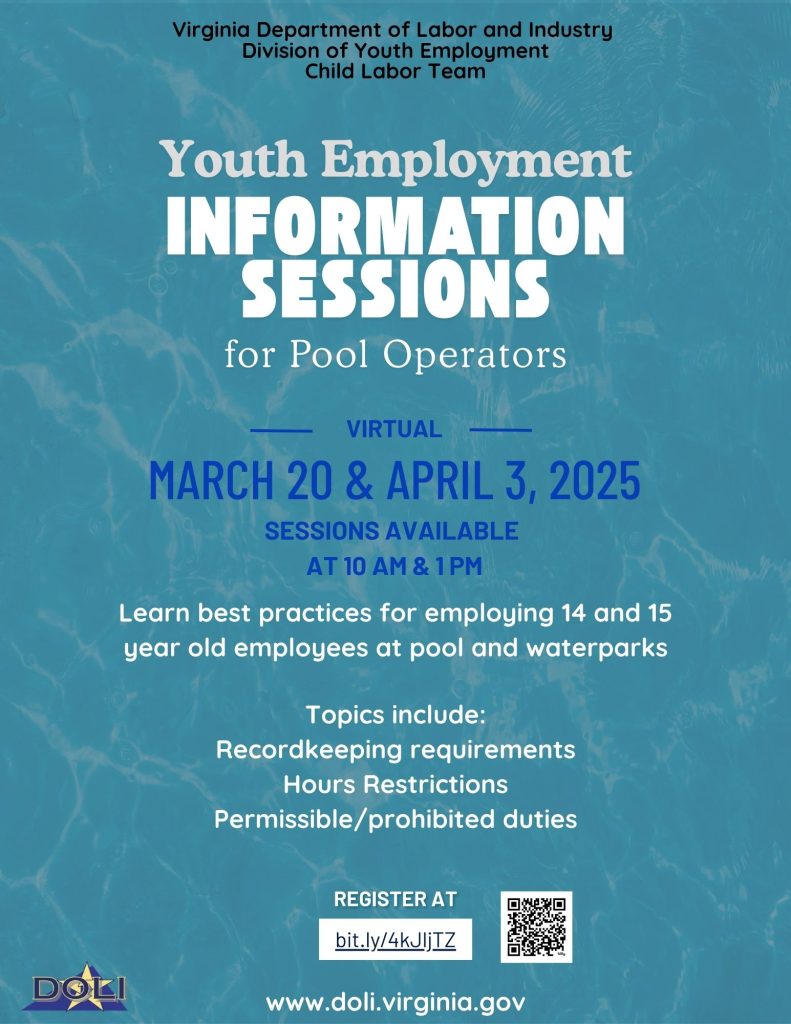
Safety and Health Codes Board Meeting – March 19, 2025
The Safety and Health Codes Board will hold a public meeting on March 19, 2025 at 10:30 AM at Libbie Mill Public Library (2100 Libbie Lake E Street, Richmond, VA 23230).
For more information, please visit: https://www.townhall.virginia.gov/L/ViewMeeting.cfm?MeetingID=41419
Inaugural Virginia Trench Safety Summit – April 22, 2025
We are excited to announce the 2025 Virginia Trench Safety Summit, scheduled for April 22, 2025, at the Virginia Public Safety Training Center (7093 Broad Neck Road, Hanover, VA 23069).
The Virginia Department of Labor and Industry, under the VOSH Institute for Learning & Outreach (VILO), along with the Virginia Department of Fire Programs and the North American Excavation Shoring Association (NAXSA) are collaborating to provide state-of-the-art excavation and trench safety training and demonstrations to workers and contractors this spring. The Virginia Trench Safety Summit 2025 will kick off with keynote speaker Eric Giguere, sharing his dynamic story of survival after being buried alive in a trench collapse. He shares his experience and perspective in a powerful and compelling story, highlighting key elements of trench safety and rescue. Virginia Occupational Safety and Health (VOSH) staff will provide information on OSHA standard and key updates on trench safety best practices and compliance. The outdoor afternoon sessions include 3 live trench side demonstrations led by industry and safety experts. Demonstrations include hydraulic shoring, proper setting and use of aluminum and steel trench boxes, and a live trench rescue demonstration by the Virginia Department of Fire Programs in partnership with the Henrico County Division of Fire.
Registration is required for this free event, which includes breakfast and lunch. To learn more, please visit: https://www.naxsa.org/page/2025-virginia-trench-safety-summit
This event is key in DOLI VOSH’s mission to promote safe workplaces and employ best practices by creating a culture of Injury Free Careers (What IF?) in the Commonwealth. VILO supports that mission as Virginia’s Center for Excellence in the development of injury and illness free career culture. NAXSA is an OSHA Alliance Program Partner for Safe Trenching and Excavation Operations.
Reminder: Workplace Standards Pertaining to Water Supply and Sanitization
Due to recent winter weather, the City of Richmond and related counties in the Richmond Metro area encountered disruptions in their water supply. This event impacted water provisions and resulted in advisories. Official updates indicate that the City and local counties are working to abate the situation and we understand some water flow has been restored. During this temporary situation, it is important to be mindful of VOSH requirements related to water and sanitization.
The Department of Labor and Industry requires that employers provide potable water in the workplace for drinking, washing, and other personal needs. The water must be readily accessible, and employers cannot require employees to pay for it. 1910.141(b)(1)(i) requires that potable water shall be provided in all places of employment, for drinking, washing of the person, cooking, washing of foods, washing of cooking or eating utensils, washing of food preparation or processing premises, and bathrooms. This applies to the construction industry as well, per 16VAC25-160-10, the construction industry sanitation standard.
Here are some other requirements for drinking water in the workplace:
- Water dispensers: Dispensers must be designed to maintain sanitary conditions, be closable, and have a tap. Water shall not be dipped from containers. Any container used to distribute drinking water shall be clearly marked as to the nature of its contents
- Containers: Open containers like barrels, pails, or tanks are prohibited.
- Drinking cups: Shared drinking cups are prohibited. The water shall be dispensed in single use drinking cups or personal bottles or containers. The use of the common drinking cup is prohibited.
- Temperature: Water should be cool.
- Quantity: There should be enough water to meet the needs of each employee.
- Refilling: Drinking water containers should be refilled daily or more often as needed.
- Cleaning: Drinking water containers should be regularly cleaned and kept covered.
Public Safety Announcement: VOSH announces new initiative to address recent increase in workforce fatalities
RICHMOND – The Department of Labor and Industry has launched a new emphasis initiative aimed at preventing workforce fatalities across Virginia. The initiative, carried out through the Virginia Occupational Safety and Health (VOSH) program, is designed to address the alarming rise in workforce fatalities. The initiative will run from January 2025 to July 2025. Throughout this period, VOSH will publish information to increase awareness and drive more focus on the top contributory hazards that yield workforce fatalities. Although VOSH works each day to prevent these tragic events, over the next several weeks, VOSH personnel will be driving awareness across Virginia and will begin with a heightened focus on work that is being conducted from heights that require fall protection. Should a VOSH Compliance Officer observe this type of work being performed, it is probable an inspection will be conducted. We kindly urge employers and employees alike to implement measures to ensure the safety of all elevated work and adhere to the applicable VOSH standards. VOSH is committed to preventing these serious and avoidable tragedies.
“Over the past few months, VOSH has conducted investigations into several preventable incidents related to a number of occupational hazards and our first focus area will be on fall hazards. These incidents can be mitigated through collaboration between employers and employees to establish and adhere to fall protection safety practices”, said Charles Stiff, CSP, Deputy Commissioner of the Virginia Department of Labor and Industry. “Ultimately, protecting our workforce is a value and as a value, it is everyone’s responsibility to uphold safe work practices and conditions. We believe Virginia’s workforce can work injury-free and it is imperative that our workforce returns home safely each day.”
Falls are one of the leading causes of fatal accidents in the construction industry. In the last two years, falls accounted for more than 30% of workplace fatalities across the Commonwealth of Virginia.
VOSH strongly encourages employers and employees to engage in a Safety Stand Down to STOP and TALK about fall protection. This initiative aims to ensure that every employee has the best opportunity to return home to their loved ones in the same condition as when they started their workday.
What is a Safety Stand Down?
It is a voluntary event where employers can provide the workforce information and awareness to work injury-free by conducting: read more…
